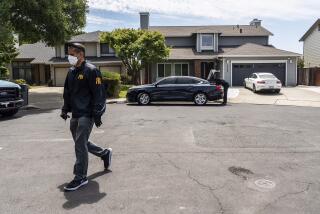Hahn’s Report, Mayor’s Speech Point Up Memory Lapses, Contradictions
- Share via
The city attorney’s report on Tom Bradley revealed that the mayor had memory lapses on crucial matters being explored by investigators and that some key documents on his dealings with a bank that hired him as an adviser were “missing” from his office files.
Moreover, in his televised speech Wednesday night, Bradley seemed to contradict earlier statements about his reasons for resigning as Far East National Bank’s only paid adviser and returning the $18,000 he had been paid.
Report Cites Letters
In his wide-ranging investigative report, City Atty. James K. Hahn cited three 1988 letters that Far East President Henry Hwang sent to Bradley and that the mayor insisted he could not remember seeing.
Two of those were disclosed for the first time in Hahn’s report. They were obtained from Far East Bank.
All three were pivotal in Hahn’s efforts to determine whether Bradley knew that Far East was seeking--or had received--deposits of taxpayer funds while he was working for the bank. Bradley had consistently maintained that the bank did not ask him for help in obtaining city deposits. He also said he was not aware of any business relationship between Far East and the city until March, 1989.
Marking them “personal and confidential,” Hwang sent the following letters to Bradley at his City Hall office within four months of putting him on the bank’s payroll:
- Hwang wrote to “Tom” on Jan. 13 expressing his gratitude for the mayor’s acceptance of a paid advisory post with the bank. In the previously undisclosed letter, Hwang outlined areas in which he wanted Bradley’s help in getting business for the bank, including developing ties to the city of Los Angeles. “In exchange for your valuable services,” Hwang wrote, “we will pay you a retainer fee of $18,000 for 1988.”
The city attorney’s office was told that this letter does not appear in correspondence logs maintained by the mayor’s office. Bradley said he had no recollection of it.
- Six days later, on Jan. 19, Hwang wrote another letter stating that “we wish to express our interest in receiving deposits and rendering bank services to the city of Los Angeles.” The letter was quickly dispatched to the city treasurer by a Bradley aide--with the notation “RUSH.” Within days, a $1-million deposit of public funds was placed with Far East.
Hwang told city attorney officials that he believed that Bradley had asked him to send the letter. Bradley told investigators that he did not remember such a conversation or seeing the correspondence when it arrived.
- In the other previously undisclosed letter, Hwang informed Bradley on April 6 that the city had placed a $1-million deposit with Far East. Investigators considered that disclosure important because it suggested that the mayor knew of a depository relationship between the city and the bank.
Bradley’s aides said they had no record of the mayor receiving this letter, and Bradley said he could not remember it.
In his report, and during an interview, Hahn expressed skepticism about the mayor’s inability to recall these key communications with Hwang.
“I have questions about the explanation the mayor has given us,” Hahn told The Times. “I have questions because there appear to be inconsistencies.”
The city attorney noted in his report that “Mayor Bradley claims he never received two of these letters . . . and claims there are no correspondence index cards showing that they were received. . . . The circumstantial evidence appears damaging and may call into question the mayor’s credibility and judgment in some areas.”
Bradley, in his televised appearance Wednesday night, said he did not recall the letters because he reviews “thousands of pages of material” each week.
“I dealt with the Far East documents in a routine way,” he said, “the same way I deal with thousands of other questions I get from constituents every year. I didn’t attach any greater significance to these.”
Another inconsistency that surfaced in Hahn’s report cast doubt on Bradley’s initial account of his actions before accepting a job with Far East.
For months, Bradley and his aides have said that the mayor asked Hwang whether his bank had any business with the city. According to this version, Bradley accepted the paid position only after Hwang informed him that the bank had no city business at the time. But, in interviews with city attorney officials and on Wednesday, Bradley said that, in fact, he did not make such an inquiry.
When asked about this by reporters, Bradley said his statements to the city attorney spoke for themselves.
In his Wednesday address, Bradley also seemed to change his version of why he returned his adviser fees to Far East.
After Bradley disclosed in March that he was returning the $18,000, he portrayed it in letters to Hwang and the city attorney as a move based on ethical considerations.
“I never would have accepted the fees in the first place had I known that the bank sought city deposits,” he wrote to the city attorney.
But in his 40-minute televised speech, Bradley spoke of how the relationship with the bank could be misconstrued by political opponents. And he added that being paid as an “international trade adviser” by a bank in which the city deposited public funds did not pose an ethical dilemma.
“I saw no connection between my circumscribed role with the bank and the independent investment decisions made by the city treasurer,” he said.
More to Read
Sign up for Essential California
The most important California stories and recommendations in your inbox every morning.
You may occasionally receive promotional content from the Los Angeles Times.










